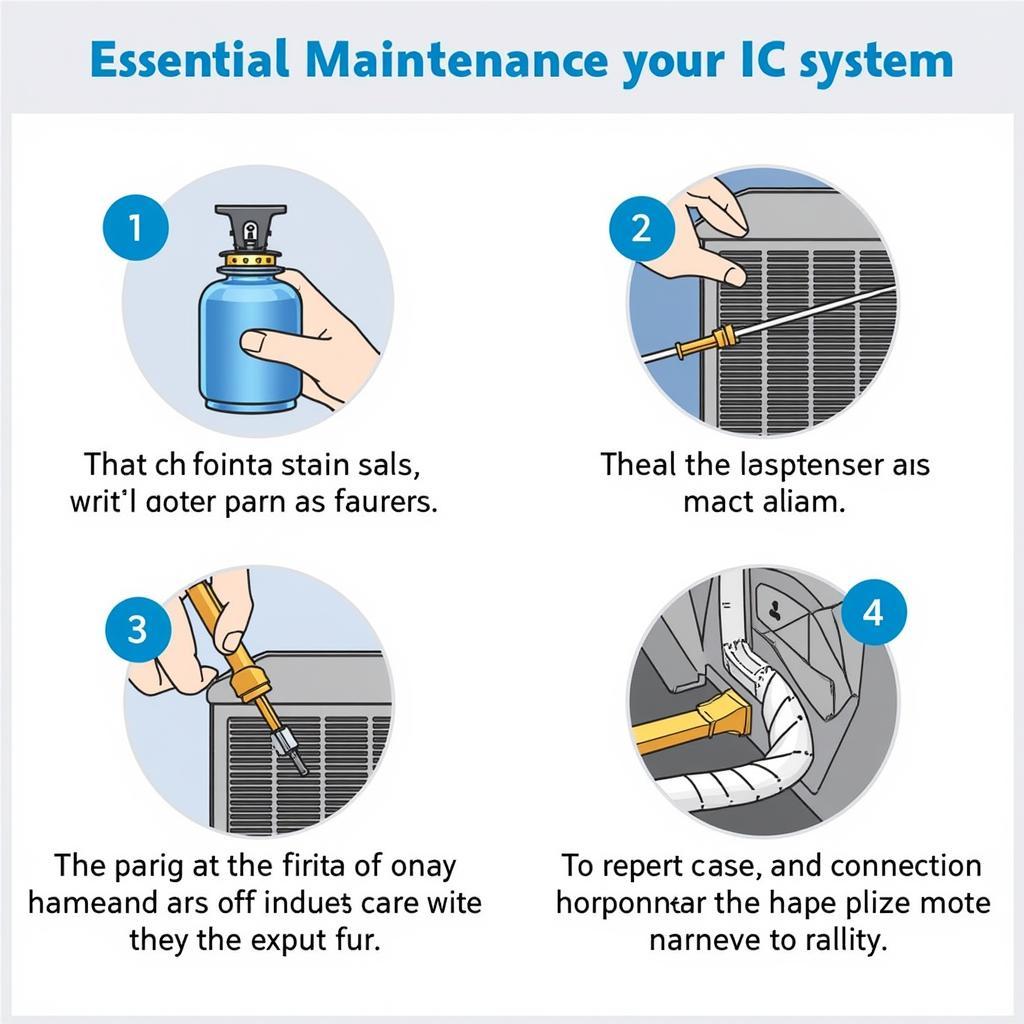A car’s AC system can spring a leak, leaving you sweating on hot days. Knowing how to fix an a/c leak in car is crucial for comfort and preserving your system. This guide dives deep into diagnosing and repairing car AC leaks, providing DIY solutions and advice on when professional help is necessary.
Identifying the source of an AC leak is the first step to a cool and comfortable ride. Several components can be culprits, from hoses and connections to the compressor or evaporator. This guide will equip you with the knowledge to pinpoint the problem and get your AC back on track.
Pinpointing the Leak: Where’s the Culprit?
Several components can be the source of an AC leak. The most common culprits include hoses, connections, the compressor, and the evaporator.
- Hoses and Connections: These are often the easiest to spot. Look for visible cracks, kinks, or loose connections. A simple tightening or replacement can sometimes solve the problem.
- Compressor: The compressor is the heart of your AC system. Leaks here can be more serious and often require professional attention. Signs include oily residue around the compressor or a loud grinding noise when the AC is on.
- Evaporator: The evaporator is located inside the dashboard and absorbs heat from the air. Leaks here can be difficult to detect and often require specialized tools and expertise. A sweet smell inside the car can sometimes indicate an evaporator leak.
- Condenser: Located at the front of the car, the condenser releases heat. Leaks here can be caused by debris impact or corrosion.
DIY Fixes: Simple Solutions for Common Leaks
For minor leaks in hoses or connections, DIY fixes can be effective.
- Inspect the Hoses and Connections: Carefully examine all hoses and connections for signs of damage or looseness.
- Tighten Loose Connections: If you find a loose connection, use a wrench to tighten it securely. Be careful not to overtighten, which could damage the connection.
- Replace Damaged Hoses: If you find a cracked or kinked hose, replace it with a new one. Make sure to use the correct type of hose and clamps.
When to Call a Pro: Recognizing Complex Issues
While some AC leaks can be tackled at home, others require professional help. If you suspect a leak in the compressor or evaporator, it’s best to take your car to a qualified mechanic. These repairs often involve specialized tools and expertise.
What if you’ve tried fix busted car window and are now facing an AC problem? It might seem unrelated, but sometimes underlying issues can manifest in unexpected ways.
Preventing Future Leaks: Maintaining Your AC System
Regular maintenance can help prevent AC leaks.
- Regular Inspections: Have your AC system inspected annually by a qualified mechanic.
- Keep it Clean: Keep the area around the condenser free of debris.
- Use the Right Refrigerant: Use the correct type of refrigerant specified for your car. Using the wrong type can damage the system and cause leaks.
 Maintaining Your Car’s AC System
Maintaining Your Car’s AC System
If you’re located in Sydney and need assistance with repairs like fix car mirror sydney, professional help is just a call away.
Conclusion: Keeping Your Cool on the Road
Knowing how to fix an a/c leak in car is essential for a comfortable driving experience. While some leaks can be addressed with DIY fixes, more complex issues require professional attention. Regular maintenance and prompt repairs are key to keeping your AC system running smoothly. For further assistance, connect with AutoTipPro at +1 (641) 206-8880 or visit our office at 500 N St Mary’s St, San Antonio, TX 78205, United States. We’re also experts in how to fix a busted car window.
FAQ
-
What are the signs of a car AC leak? Common signs include weak airflow, warm air from the vents, hissing sounds, and a sweet smell inside the car.
-
How much does it cost to fix a car AC leak? The cost can vary depending on the location and severity of the leak. Minor repairs can cost a few hundred dollars, while major repairs can cost over a thousand.
-
Can I use a sealant to fix an AC leak? Sealants can be a temporary fix for small leaks, but they’re not a long-term solution.
-
How often should I recharge my car’s AC? It’s recommended to have your AC system checked annually by a mechanic. They can determine if a recharge is necessary.
-
Can I fix a car AC leak myself? Minor leaks in hoses and connections can sometimes be fixed with DIY methods. However, more complex leaks require professional attention. You could also look into window fixing near me car for general car repair assistance.
-
What type of refrigerant does my car use? The type of refrigerant is usually listed in your car’s owner’s manual or on a sticker under the hood.
-
Is it dangerous to drive with an AC leak? While it’s not immediately dangerous, driving with a leak can eventually damage the compressor and other components, leading to more costly repairs. For those interested in car modifications, check out cleo fix car gamemodding.





Leave a Reply